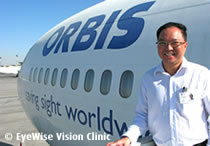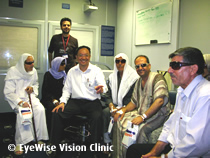Project ORBIS
Dr Christopher Khng “Flies High” with The Flying Hospital to Treat the Less Fortunate.
Singapore’s ophthalmology will be flying higher to new grounds on June 22, 2008, with the selection of Dr Christopher Khng to join the ORBIS Flying Hospital Team on its mission to Aleppo in Syria. Dr Khng is the first-ever Singaporean to be selected to join the ORBIS Flying Hospital.
Dr Khng, who is one of Singapore’s ophthalmologist to be trained in dealing with complicated cataract cases, will join a team of ophthalmologists in the Syrian city, where they will train 50 Syrian ophthalmologists, 30 nurses and 15 biomedical engineers in various topics like the latest techniques and technologies in ophthalmology, general maintenance of ophthalmologic equipment and post-operative care of patients.
During the tour to Aleppo, the ORBIS team will perform sixty eye-surgeries and an additional 20 laser procedures will be performed during the medical retina sessions. All of these sessions will be performed on a plane that is fully fitted out to be a teaching hospital.
“ORBIS has spent the last 25 years crossing cultural and geographical lines to help save the sight of many people;” says Dr Christopher Khng. “Singapore was a beneficiary of ORBIS’s services until 1996 and I am really honoured that I am able to give back to ORBIS by being part of their team to Syria. The standard of ophthalmology and other eye-care services has developed to very high level in Singapore and now, I have the honour of sharing what we have achieved with my Syrian counterparts, so that they can reduce the number of people who lose their sight in Syria and the Middle East Region.”
Syria has a total population of 18.6 million people and as many as 130,200 people are blind with another 837,000 suffering from low vision. Around 45 percent of all cases of blindness in Syria are due to cataracts. Other treatable ailments that have caused blindness due to lack of treatment include, corneal scars, glaucoma and diabetic retinopathy.
“Many of the causes of blindness in Syria are treatable,” says Dr Khng. “I am honoured to have been selected by ORBIS to help in its mission to save people from unnecessary blindness. I look forward to being able to use my knowledge and experiences to help the less fortunate, and to working closely with the international team of professionals from America and the UK.”



